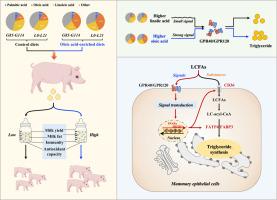富油酸饮食通过GPR40和GPR120信号通路改善产妇泌乳性能和新生儿生长
IF 4.9
2区 医学
Q1 BIOCHEMISTRY & MOLECULAR BIOLOGY
引用次数: 0
摘要
油酸是乳脂的主要单不饱和成分,但其在泌乳中的具体作用尚不清楚。本研究评估了富油酸饲粮对母猪泌乳性能、乳成分和子代生长的影响,并探讨了其潜在的调控机制。80头母猪在整个妊娠期和哺乳期随机饲喂标准日粮或高油酸日粮。测定仔猪乳脂含量、脂肪酸分布及断奶体重。同时,用油酸处理猪乳腺上皮细胞(pmes),用或不加GPR40和GPR120选择性抑制剂,研究受体介导的对甘油三酯合成和脂肪酸转运蛋白表达的影响。饲粮中添加油酸可显著提高乳脂含量,使乳脂脂肪酸谱向单不饱和脂肪酸水平升高,从而提高仔猪断奶体重。免疫球蛋白、抗氧化酶和炎症介质从母猪到新生儿的转移增强进一步表明新生儿恢复能力增强。在pmes中,油酸上调CD36、FATP4和FABP3的表达,并通过激活GPR40和GPR120促进甘油三酯的合成。药物阻断显示GPR40抑制使甘油三酯积累减少了约37.6%,而GPR120阻断产生了更温和的下降。总之,这些研究结果表明,油酸通过gpcr依赖的信号传导提高乳脂产量并支持后代生长,其中GPR40起主导作用。本文章由计算机程序翻译,如有差异,请以英文原文为准。

Oleic acid-enriched diet improves maternal lactation performance and neonatal growth through GPR40 and GPR120 signaling pathways
Oleic acid represents a major monounsaturated component of milk fat, yet its specific roles in lactation remain unclear. This study evaluated the impact of an oleic acid-enriched diet on sow lactation performance, milk composition, and offspring growth, and investigated the underlying regulatory mechanisms. Eighty sows were randomized to either a standard diet or a high-oleic acid diet formulation throughout gestation and lactation. The milk fat content, fatty acid profiles, and weaning body weight of the litter were measured. In parallel, porcine mammary epithelial cells (pMECs) were treated with oleic acid, with or without selective inhibitors of GPR40 and GPR120, to dissect receptor-mediated effects on triglyceride synthesis and fatty acid transporter expression. Dietary enrichment with oleic acid significantly increased milk fat content, shifted the milk fatty acid profile toward higher monounsaturated levels, and resulted in greater weaning body weight in piglets. Enhanced transfer of immunoglobulins, antioxidant enzymes, and inflammatory mediators from sow to neonate further suggested improved neonatal resilience. In pMECs, oleic acid upregulated CD36, FATP4, and FABP3 expression and boosted triglyceride synthesis via activation of both GPR40 and GPR120. Pharmacological blockade revealed that GPR40 inhibition reduced triglyceride accumulation by approximately 37.6%, whereas GPR120 blockade produced a more modest decrease. Together, these findings demonstrate that oleic acid enhances milk fat production and supports offspring growth through GPCR-dependent signaling, with GPR40 playing the dominant role.
求助全文
通过发布文献求助,成功后即可免费获取论文全文。
去求助
来源期刊

Journal of Nutritional Biochemistry
医学-生化与分子生物学
CiteScore
9.50
自引率
3.60%
发文量
237
审稿时长
68 days
期刊介绍:
Devoted to advancements in nutritional sciences, The Journal of Nutritional Biochemistry presents experimental nutrition research as it relates to: biochemistry, molecular biology, toxicology, or physiology.
Rigorous reviews by an international editorial board of distinguished scientists ensure publication of the most current and key research being conducted in nutrition at the cellular, animal and human level. In addition to its monthly features of critical reviews and research articles, The Journal of Nutritional Biochemistry also periodically publishes emerging issues, experimental methods, and other types of articles.
 求助内容:
求助内容: 应助结果提醒方式:
应助结果提醒方式:


